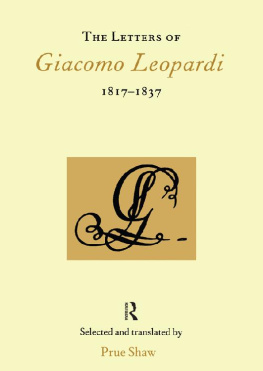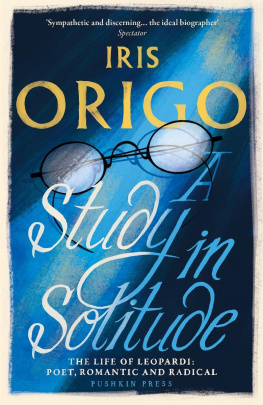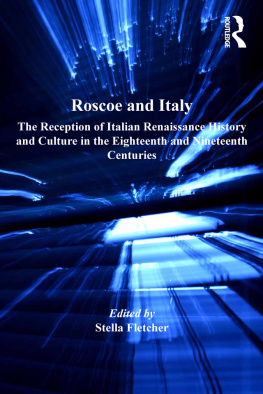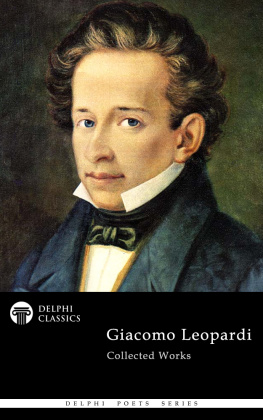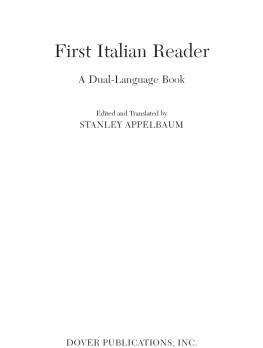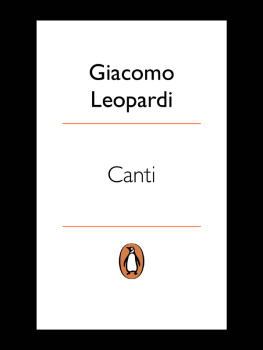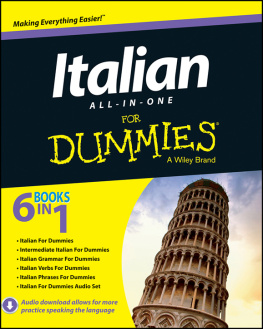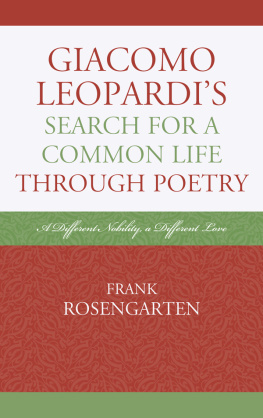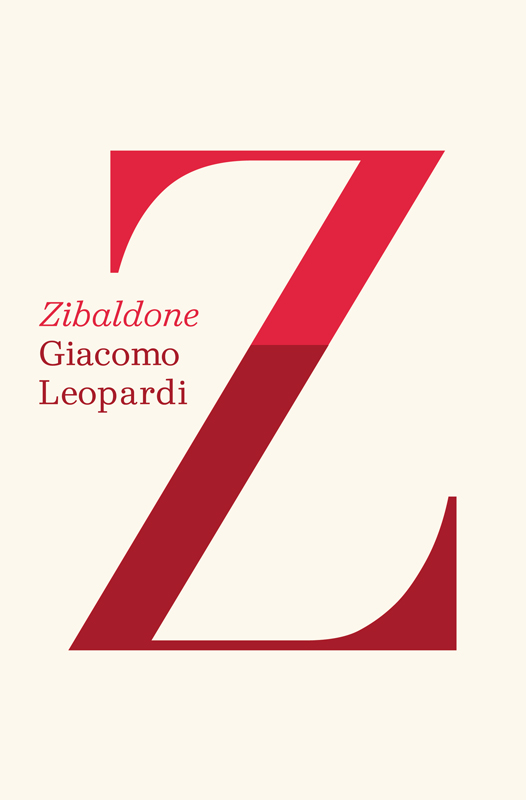
The author and publisher have provided this e-book to you for your personal use only. You may not make this e-book publicly available in any way. Copyright infringement is against the law. If you believe the copy of this e-book you are reading infringes on the authors copyright, please notify the publisher at: us.macmillanusa.com/piracy.
Contents
Acknowledgments
The realization of the first complete English edition of Leopardis Zibaldone, a project that has taken seven years to bring to fruition, would not have been possible without the constant moral and financial support of the Centro Nazionale di Studi Leopardiani (CNSL) under the leadership first of Franco Foschi and then, after his death, of Fabio Corvatta. The Leopardi Centre at the University of Birmingham (UK), founded with the sponsorship of the CNSL in 1998 to promote teaching and research around the figure of Leopardi, adopted the edition of the Zibaldone in English as its flagship project in 2006, once the pilot translation (Z , by Kathleen Baldwin) had shown that the enterprise, daunting as it appeared to be, was possible and feasible. The next challenge was to raise sufficient funds to complete the translation, and in this we were helped by private individuals, cultural foundations, and institutional bodies in Italy. We particularly want to acknowledge a grant awarded in aid of the translation by the Italian Ministry of Foreign Affairs, as well as the generous support of the Fondazione Christian Cappelluti, the Fondazione Luigi Berlusconi, the University of Rome Sapienza, and the numerous smaller and larger contributions made by individual citizens in response to a public appeal for funds in aid of the translation. We wish also to express our particular gratitude to Antonio Moresco and Massimiliano Parente for their support in this phase of the project. Once the translation was well under way, we felt sufficient confidence to approach the UK Arts and Humanities Research Council (AHRC) for support with the editorial dimension of the work. The council awarded a research grant for the period between September 2008 and March 2011, which enabled us to appoint a research fellow, Dr. Martin Thom, who during his tenure provided essential backup to all the principal aspects of the edition, and to employ a small and dedicated cohort of postdoctoral research assistants, revisers, and checkers: their work is described below.
The support of the AHRC also enabled us to mount three public events connected with the edition in the course of 2010: a half-day symposium, (Re-) Translating the Italian Classics, held at Birmingham in February; a day-long seminar on quotation practice in European and non-European cultures (Con voce daltri: scrittura, riflessione, citazione, University of Rome Sapienza, held in May); and a two-day international conference titled Thinking in Fragments: Romanticism and Beyond, again at Birmingham, in December. These events were enhanced by additional financial support from the School of Languages, Cultures, Art History and Music at Birmingham, the Faculty of Oriental Languages at Sapienza, and the Society for Italian Studies, as well as by the continuing support of the Leopardi Centre and the CNSL. Our thanks go also to the University of Birmingham, whose granting of a one-year sabbatical to Michael Caesar in 20082009 allowed him to devote himself full-time to the project during that period, and to our publisher, Jonathan Galassi, whose interest and support have been a constant stimulus and reassurance.
The seven principal translators listed on the title pageKathleen Baldwin, Richard Dixon, David Gibbons, Ann Goldstein, Gerard Slowey, Martin Thom, and Pamela Williamswere responsible for the translation of several hundred Zibaldone pages each. We also wish to acknowledge the contribution made by Judith Landry and Jenny McPhee, who translated shorter passages. The process of translation was both iterative and collaborative. Agreed working practices were established at a three-day workshop held in the Marche in the fall of 2008, not far from Leopardis hometown, thanks to the hospitality of Richard Dixon and Peter Greene, and these were reinforced by exchanges of views between the translators themselves and between the translators and the editors, and constant revision on the part of the editors, advised as necessary by other experts, as the translation matured.
We would like to thank our translators for all the work they did (sometimes beyond the call of duty). We owe an additional debt of gratitude to Ann Goldstein and Gerard Slowey for their translations of the Introduction.
A crucial new tool came to our assistance with the release in 2009 of the CD-ROM version of the Zibaldone, including the photographic reproduction of the manuscript and extensive search facilities, edited by Fiorenza Ceragioli and Monica Ballerini. We are very grateful to Lorenzo Enriques of Casa Editrice Zanichelli for making the CD-ROM available to us free of charge, and to Pasquale Stoppelli for giving us permission to use the transcriptions from Greek, revised by Daniele Fusi. In the thorough back-checking of the initial English translations against the Italian original, with particular reference to consistency, we were assisted by Valerio Larena and Davide Martirani; Valerio Larena also afforded us skillful guidance in our translations from Latin and Greek. Ann Goldstein, Gerard Slowey, and Martin Thom, in addition to their own translations, also undertook to review certain particularly difficult passages. We are additionally grateful to Ann Goldstein for her expert copyediting of the first thousand pages, which set a high standard for the final revision of the text as a whole, as well as for her comments on the notes to many of these pages.
* * *
For the compilation of the editorial notes, we are particularly indebted to the late Contessa Anna Leopardi, who both encouraged and welcomed us to make full use of the historic library housed in Palazzo Leopardi, and to Francesco Fabretti and Carmela Magri for their unfailing helpfulness. Much of the research, in particular the thorough checking of the sources mentioned or alluded to in the Zibaldone, was undertaken with the help of Elisabetta Brozzi and Valerio Camarotto. Gerard Slowey did significant research on the index of names (subsequently incorporated into the single editorial index), and Marco DUrso established a number of the more important or more problematic of the thematic index entries, structured according to the new criteria established by the editors. At proof stage we were able to count on the kind collaboration of Ilaria Andolfi, Nadia Cannata, Enrico Cerroni, Rodney Lokaj, and Maurizio Sonnino.
Throughout the editorial process we have been supported by our advisory boardcomprising Margaret Brose, Christian Genetelli, Mara de las Nieves Muiz Muiz (Leopardi), Paul Hamilton (eighteenth- and nineteenth-century literature and philosophy, Romanticism), Giulio Lepschy (language and linguistics), Roberto Nicolai (classical languages), and Giorgio Stabile (philosophy, science, and theology)whom we have consulted on a regular basis, and by many friends and colleagues, who have acted either as specialist consultants or in response to specific queries or requests for help. In particular, we would like to mention the following.
Specialist consultants for Chinese: Federico Masini; Classics (Latin and Greek): Albio Cesare Cassio, Simon Swain; German literature: David Hill, Giovanni Sampaolo;


